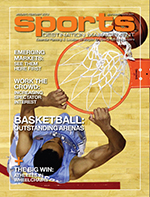Sports Destination Management Magazine
2016
Want to learn how to put on the best event possible? Learn from the best! The March/April 2016 issue of Sports Destination Management has insights from some of the most well-regarded thought leaders in the industry. Learn about medical support and planning, event insurance, hotels and accommodations – even stay-to-play. Soccer, swimming and diving events and golf are covered, along with disc golf, the mountainous areas of the U.S. and a look at US Youth Soccer. Leap into spring – and learning.
Click here for Digital VersionThis issue has some great insights on perfecting sports events, from that first bid to the final whistle. See the articles on social media strategies, recording and streaming events, planning for athletes with disabilities and more. There’s also great information on hosting basketball, winter and ice sports and skateboard and BMX events. We’ll look at the Northeastern region of the U.S. and at some of the new and expanding markets, just waiting for your next event. Get a jump on 2016 now.
Click here for Digital Version2015
This issue of Sports Destination Management has all the trends keeping sports current. Learn about the forces shaping volleyball, tennis, equestrian events and strength and fitness competitions. There’s also a great profile of US Soccer and on the Midwest. You’ll learn about event merchandising, hotel negotiations and using apps in event management, as well as hints on keeping an event fresh, year after year. Plus coverage of our first ever awards program, Champions of Economic Impact in Sports Tourism. We’re honoring the events and partners that make our industry great and you won’t want to miss a word of it.
Click here for Digital VersionThe calendar is turning, and sports are moving along. It’s time to start planning softball tournaments, so don’t miss this roundup of some of the best diamonds in the country. The Summer Olympics in Rio will bring extra attention to water sports and to gymnastics – something else covered in these pages. You can learn about negotiating with venues, working with sports commissions and CVBs, event security and the newest trends in team travel. There are great articles on facilities in the Southwest and Pacific, and on facilities across the U.S. A new season of sports is here. Turn the page and get a sneak peek.
Click here for Digital VersionThe best things in life really are free, and you’ll find them in this issue of Sports Destination Management. Not only does our Perspectives article detail the best ways to recruit and work with volunteers, but all the industry experts who shared their knowledge with us did so voluntarily. Don’t miss the articles on stay-to-play, working with sports commissions, legal issues, cheer & dance and the USGA. We also delve into what makes a successful event in running and road sports, combative sports and lacrosse, and we examine the Southeast as a destination. Your summer learning starts here. Turn the page to get a jump-start.
Click here for Digital VersionThe old adage in real estate is location, location, location. In this issue, we talk about locations for soccer, fishing and track & field. There’s also information on maximizing economic impact, giving athletes the star treatment, tapping into the senior athlete market, organizing multisport events – and even educational programs designed to turn out more knowledgeable professionals. You’ll also learn about specific locations – such as the Mid-Atlantic area – and about some of the most promising personnel to help you put on your best event ever. It’s a great issue and you won’t want to miss a word.
Click here for Digital VersionYour business is the business of sports – all that goes on behind the scenes to make the athletes look good and the spectators feel proud. This issue of Sports Destination Management includes some of the best information in the business, written by the best professionals in the business. Learn about insurance, stay-to-play, lodging and medical planning, as well as updates about the AAU and US Quidditch. You can also learn about the best facilities – and the best tips – for hosting can’t-miss golf, baseball and aquatics events, as well as some great venues if you’re planning a sports event in the mountain states. Click here to start your learning experience now.
Click here for Digital VersionMake a resolution to start 2015 the right way. The January/February issue of Sports Destination Management has the tools you’ll need to create a better bid package, promote your event through targeted social media strategies and even learn about live-streaming events. We’re covering the basketball facilities you just might be seeing this March, but this issue also brings you the chance to learn about the trends shaping winter events, the facilities of the Northeast and how BMX and skateboard events are gearing up for warm weather. We also have a special section highlighting up-and-coming destinations for sports. Get started by clicking now!
Click here for Digital Version2014
Where are some of the most exciting developments in our industry occurring? At the intersection of sports and technology. The November/December issue of Sports Destination Management has all the details. What can mobile apps do for your event? How is technology influencing the merchandising and promotional industry? How can it help you communicate if your event should have to shift into crisis mode? You can learn it all here. In addition, you’ll learn about the evolution and rise of fitness competitions – currently relying heavily on social media for their promotion and branding. Plus, you’ll get the latest on equestrian sports and rodeo, volleyball and tennis facilities. Learning starts now. Turn the page to get started.
Click here for Digital VersionIf you want the best insights into sports planning, the best place to start is with industry experts. This issue of Sports Destination Management has them all. Take a look at the articles on long-term contracts, safety and security, transportation options and negotiations with facility vendors, as well as the Sports Outlook article on USA Cycling, and the Executive Insights piece on the Professional Disc Golf Association. Destinations and NGBs from sports across the nation have shared their photos and ideas about soccer, gymnastics and water sports. Our Regional Focus article features interviews with cities in the Southwest and Pacific, highlighting some new and favored facilities. There’s more too; our From the Web feature highlights some industry news that appeared on our site, sent in by our readers. Open the pages and ready yourself for a wealth of knowledge.
Click here for Digital VersionWant to stay ahead and not just keep up? Want to work smarter, not just harder? The July/August issue of Sports Destination Management can help you achieve those goals. We have information on the best destinations for lacrosse, new trends in the running world and proven strategies for winning with wrestling, boxing and martial arts events. Get the facts on MRSA and learn to harness the power of stay-to-play policies to capture your best returns yet. This issue brings together some new sports (pickleball), provides updates on the powerhouse sports of cheer and dance, and teaches you to tap into resources your CVB can provide to help raise your event’s media profile. Learn everything you need to know, starting here and now.
Click here for Digital VersionSports event planners, don’t lose another minute—find out in this May-June 2014 issue of Sports Destination Management how to stay ahead of the curve and on top of developing trends, like events for senior athletes. Our in-depth coverage of the best practices to make events successful for senior athletes will put you on top of your game—and help you help them to be the best they can be, too. Not sure what it takes to be eco-friendly? Find out in our article on sustainable sports events. You will come away with the best tips for planning, marketing and even making key partnerships that will enhance your event at every turn – and even inspire others to follow suit. Triathlon is one event experiencing explosive growth, thanks to three key initiatives at the national level. Learn what those are and how they can be implemented at your next event in the article, “Triathlon and Beyond: New Trends in Multisport.” The spring sports season has officially kicked off. Make the most of it with the outstanding industry insights you’ll find in the pages ahead.
Click here for Digital VersionSometimes, when we’re surrounded by top-notch sports complexes, we forget that many kids get their first introduction to sports – and the great outdoors in general – at their local parks. The facilities are free and they’re a great place for kids to unplug from the computer and connect with their friends. This issue gives us a great look at some fascinating facilities and in fact, some are based in city-owned and operated parks. We have a wealth of information in this issue, including articles on insurance, hotel selection, medical support at sports events, and how to effectively plan an event for athletes with mobility limitations. Don’t miss our feature on the mountain region of the U.S. either – it’s a lot more than skiing and hiking destinations. We’ll look at baseball facilities around the U.S. and get some insights into what goes into a successful swimming and diving event. We’ll also find out what is going on in the golf industry – as the Summer Olympics creep ever closer, what is this sport doing to bring in new players and rejuvenate its image? In addition, there are great features on various destinations and businesses. It’s all inside these pages, so enjoy – and learn.
Click here for Digital VersionThe post-holiday winter doldrums might not get people fired up about sports – until you think about how much is waiting for us. As the Olympics in Sochi take over our TVs, America will be enjoying anything and everything taking place on ice and snow.
Click here for Digital Version2013
Sports requires great athleticism but it also demands unparalleled strategy. Whether athletes are on the field, in the pool, in the ring or on the court, whether they’re with a team, with a partner or all alone, they need a game plan in order to win.
Click here for Digital VersionAthletes are, by nature, creatures of habit. We like to work out certain ways, at certain times, in certain places. We have pre-competition routines we like to follow in order to reach what we feel will be the best possible outcome. And we like to play in the same locations, in and on facilities where we feel comfortable.
Click here for Digital VersionIn browsing photos for use with an article in this issue, I came across a series of shots taken at a boxing match. One athlete was getting pounded mercilessly by his opponent but each shot showed him fighting his way upright and charging back toward the center of the ring. It was an action that in every way, mirrors our experiences...
Click here for Digital Version“Be prepared to overcome obstacles.” It’s probably the best advice I ever got, and it came from a race director who was in favor of advance planning, since as he said, things will always happen on race day, and the more you’ve done in advance, the better off you’ll be.
Click here for Digital VersionThere's not a lot of news that comes out about the sports tourism industry that makes me upset. At this point, however, I'm really upset about what I see as a boneheaded move on the part of the IOC. The omission of wrestling from future Olympics is, as far as I'm concerned, one of the most boneheaded moves I have ever seen. Not that I like to point fingers or anything.
Click here for Digital VersionWe're starting a new year, and health clubs are filling up with what has become known as 'the resolution crowd.' A lot of resolutions have to do with people making a commitment to a new and healthful trend in their lives. And when it comes right down to it, the landscape of sports is all about keeping tabs on emerging trends. In fact, we've dedicated this issue of Sports Destination Management to what we see as some of those important changes.
Click here for Digital Version



















